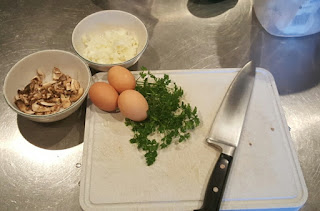Easter menu:
- Lamb chunks marinated in red wine, red vinegar, olive oil, fresh rosemary and oregano.
- Cream of asparagus soup (recipe courtesy of the spring 2016 issue of edible Ojai and Ventura County)
- Freshly baked bread (pizza dough recipe doubled and allowed to rise over a full day)
- Dragon Fruit Sorbet for dessert (Brother Duncan's choice)
Wine from Brian's Cellar: 2005 Blair Fox Syrah; Paradise Road Vineyard Santa Barbara County
I had the pleasure of tasting at this vineyard three years ago, right around Christmas 2013 in the Los Olivos area.
 |
| Left to Right: Dad, me and sister Danica |
"What a cool Dad!" Shannon, the tasting room attendant, said, upon hearing that my Dad was taking us on a wine-tasting tour.
Being the oenophile that he was, Dad always made sure that we knew about the wine we were tasting. And (to our dismay), he taught us how to spit out the wine so we could taste ALL the wine. We have several Blair Fox wines in Brian's Cellar, so we chose one for our Easter dinner. I'll talk about Dad's love of wine, and how he influenced my love of wine, in future blog posts.
Raising an Arab Father in America
"Eat it Now" lamb shish kabobs refers to the first short story "Rising an Arab Father in America" in the memoir The Language of Baklava by Diana Abu-Jaber. In this story the author's father, a Jordanian who moved to the States and married an American, attempts to rediscover his roots by attempting to cook lamb shish kabobs from scratch. Having read this story some years ago at Westmont, I remember having learned from this story that the lamb must be calm before it is killed, or else the meat spoils. The father, Bud, and his brothers learned that after living for so many years in America they had forgotten how to properly kill a lamb, and spoil the meat for the shish kabobs in the process of killing a lamb that the children fawn over.
Reading it four years later, I realize how Abu-Jaber's stories relate to me, though I am Filipino-American rather than Arab-American. I remember Dad forgetting how to kill a fish properly after so many years away from the cabin in Wyoming, or how the Philippines had changed after twenty-one years for Mom. Time changes everything, and though Abu-Jaber's story illustrates an extreme, it is amazing to look back upon one's life and realize how easily you can forget how to do something that defined your childhood.
Next week: "Nostalgic Chicken Livers" and "Bud's Special Rice for Special Company" in the short Story Hot Lunch.






